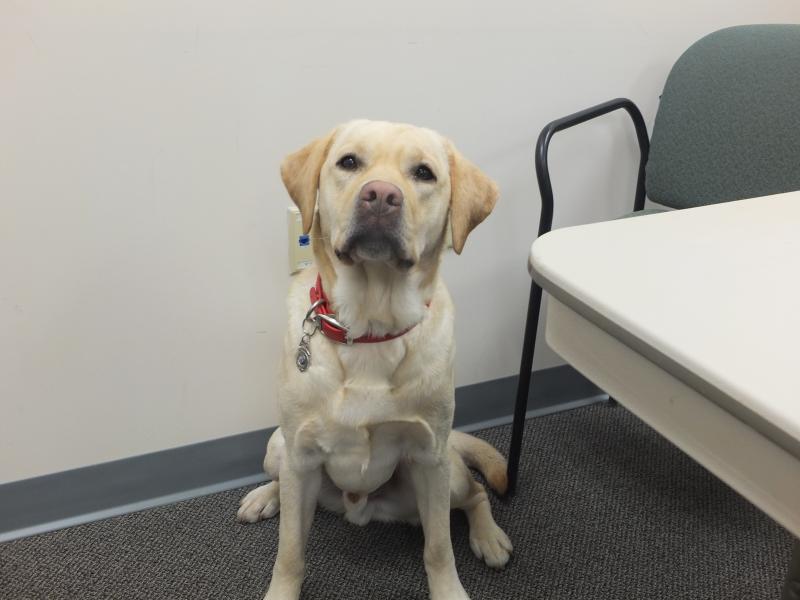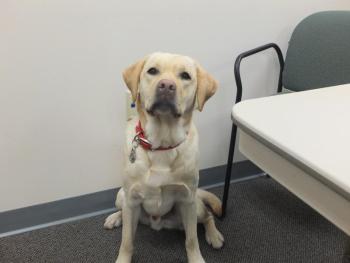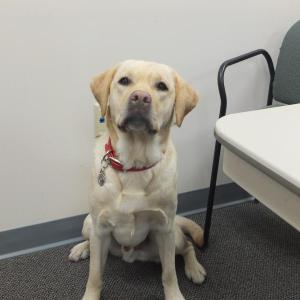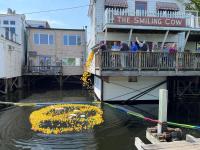Deacon collects evidence by following his nose: The life of a Maine arson dog
 Deacon is a puppy with fun, heart, and a valuable nose. (Photo by Sarah Thompson)
Deacon is a puppy with fun, heart, and a valuable nose. (Photo by Sarah Thompson)
 Deacon is a puppy with fun, heart, and a valuable nose. (Photo by Sarah Thompson)
Deacon is a puppy with fun, heart, and a valuable nose. (Photo by Sarah Thompson)
In the aftermath of a Rockland fire on James Street, Aug. 30, 2016, investigators of the state’s Fire Marshal office determined that gasoline had been used to intentionally set the home ablaze. How did they know that? Deacon, a two-year-old arson dog, one of two such canines in the State of Maine’s employment, helped to make that call.
Deacon, who is specially trained for the job, followed his nose to the fire’s source.
Friendly, happy, and energetic, the yellow lab is all dog — and then some. His ability to detect anywhere from 25 to 40 different chemical compositions associated with arson keeps him on his paws.
He is constantly in training, and his role is vital to the Fire Marshal’s Office. Deacon has been trained through the State Farm accelerant detection canine program, and Harry, the state’s other arson dog, has been trained through the federal Alcohol, Tobacco and Firearms accelerant detection canine program.
What specific chemicals arson dogs detect depends on the canine, according to his handler, Investigator Mark Roberts.
“It depends on the dog, and the dog’s nose, and what they characterize in their brain as close enough to the training aid,” he said. “But it’s typically a wide spectrum from light petroleum distillates to heavy petroleum distillates. Lighter fluids to kerosene or diesel fuel and everything in between.”
Deacon’s job is to help the investigation team collect evidence, which is then shipped to the crime lab for identification. Likewise, investigators may also call upon Deacon to prove the absence of arson chemicals.
Environmental factors may slow down his response time in connecting to a scent, but eventually he will get it. Take a container of gasoline in the backyard, for example, said Roberts.
“If the wind is blowing away from you, it’s going to take a long time to smell that,” he said. “But if the wind is blowing toward you, you’ll smell it a lot sooner.”
In cold temperatures, the scent doesn’t travel as far. The warmer the temperature, the quicker the evaporation into the atmosphere.
No matter what, if it was ever there, Deacon will find it. And for him, the work is fun.
“He gets to play hide and seek all of the time,” Roberts said.
A casual observer watching Deacon zero in on a source may see the dog sit and point with his nose. But to Roberts, who is with Deacon 24 hours a day, seven days a week, the dog’s reactions are far more complex.
“When he’s getting close to something he’s looking for, I can see a difference in his behavior,” Roberts said. “I know that he is looking. You’ll see his head start to turn. You’ll hear him start to breath heavier. He’ll turn his head back and forth, looking for the source. He wants to find the heaviest concentration of what it is that is there so we get the best evidence possible.”
Case loads are unpredictable, and depend upon the number of fires and number of calls for further investigation. In the Midcoast, Deacon has been to Washington and Rockland, according to Roberts. The pair have also been as far north as Mars Hills, to Pittston, several Oxford County towns, and south to Portland, Old Orchard Beach and Saco, with several stops in the middle.
Sometimes Deacon visits two burned structures in a day. And then there are days or weeks at a stretch when he remains at the office. During those times, he sleeps and trains while Roberts continues with the full case load assigned to him. Day or night, in the office or in the car, one thing remains standard: Dog and handler are always together.
Deacon is in training 365 days per year, and has been since the day he was brought from Michigan to Maine. This will continue until the time, years from now, when he’ll nap his way through retirement.
His reward for finding questionable chemicals is food. If he doesn’t find the chemical, he doesn’t eat.
But don’t worry. The dog eats well. Two to three times every day, Roberts initiates that game of hide and seek, so Deacon can keep the association between detection and reward alive.
According to the Office of the Fire Marshal: “The dogs must be ‘worked’ daily, and the investigator taking care of the dog must set up a ‘scene’ where there is accelerant for the dog to find. Once the dog has found the substance and notified the investigator, then the dog will be given its dinner. This reinforces the dog's association of getting fed when they find accelerants. The dogs and their handlers have to be recertified as a team each year in order to retain their legal ability to investigate fires.”
Deacon does not wear special garb. No hard hat. No flame-retardant vest. No need for booties since he can detect chemicals long after the ashes stop smoldering. He does have an official Fire Marshal tag attached to his collar that he wears for special occasions.
He arrived in Maine for his second career, and in a field where black labs are usually the choice breed, Deacon is thriving in sniffing out evidence.
The State Farm Arson Dog Program was established with guidance from the Maine Criminal Justice Academy.
“The Maine State Criminal Justice Academy is renowned for its training of canines and its national reputation in law enforcement investigation,” said State Farm, at its website. “Two decades later, all teams in the State Farm Arson Dog Program are still trained and certified according to Maine State Criminal Justice Academy standards.”
The majority of canines in the State Farm Arson Dog Program are obtained from animal shelters, rescue organizations, or certified companion programs, according to State Farm. Many of the dogs are “career change” or “second career” canines, meaning that these dogs were raised to be a disability assistance or guide dog but didn’t complete their training because the dog was too energetic. These dogs are given a second chance to serve by training as an accelerant detection canine.
Deacon’s first career is not known, but it is apparent he has found his niche. Take the appreciation of food, the ability to accomplish a task in just minutes (and one that may take humans hours or days to finish), and throw in a loving handler and friendly home, and what fills the air is nothing short of a winning scent.
Reach Sarah Thompson at news@penbaypilot.com
Event Date
Address
United States
























